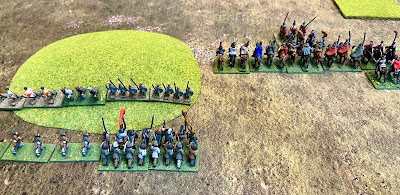A visiting friend is big into the ancient and medieval rules De Bellis Antiquitatis (DBA). I have a copy of the latest version (V.3) but have rarely played with them since they came out. I used to play DBM, but like others, it didn't feel much like any ancient battle I have read about, and we all moved on. However, a post-dinner game beckoned, so I decided to dust them down.
They are an elegantly simple set of rules, played with just 12 elements, which means a game can be set up quickly and played in about 90 minutes. However, I had forgotten just how badly they are written and presented. Phil Barker is a brilliantly innovative rules writer, but the presentation is far short of modern standards. So, I struggled with several sections of the rules but got there with the help of another pal who plays on the DBA circuit and a couple of YouTube videos. I recommend downloading the excellent Society of Ancients quick reference sheet. I see on the Facebook page that a new edition is planned to not change the rules but to improve the presentation.
The other attraction of playing DBA was an excuse to dust down the many 15mm ancient and medieval armies I have, which are, needless to say, mostly from the Balkans.
I started chronologically with my Assyrians and Greeks. I painted up the Assyrians after seeing the British Museum special exhibition, but they have yet to see much action.
This was followed by an unlikely and successful Assyrian invasion of Rome.
The Romans haven't had much luck on my tabletop, as in the next game, the Ancient Britons crashed through them. Blades are powerful but brittle against warbands.
The terrain rules are important in DBA, mainly if you are the defender. The Slavs only appear on a few wargame tables because you need a lot of rough terrain to give them a chance. I lost my general, which didn't help, but the rules gave the poor old Slavs a fighting chance.
The Bulgars got some decent terrain for their fight against the Byzantines next. However, it was not enough to avoid a trip to Specsavers!
The Ostrogoths had more success against the sneaky Byzantines.
After my trip down south, we returned to DBA for the midweek game. This year is the centennial anniversary of the end of the Serbian-Bulgarian War of 924 - OK, pretty obscure even for me! The Bulgars won this time as they did historically.
Having enjoyed our games of DBA, I thought we might try out DBA Renaissance. There are a couple of versions knocking around, but I went with Stephen O'Leary's adaptation, published some time ago in Wargames Illustrated. My bedtime reading was Tranter’s Rough Wooing, which involved Henry VIII sending his minions to burn the Scottish Borders. Not this time, he was sent back to think again!
Having mastered the rules, I have enjoyed the games we have played. They work really well for a quick evening game. The system is simple but with plenty of subtlety in the gameplay.









Good stuff. I’ve long been a fan of DBA although I don’t play anywhere near enough. I collect armies and, when I play, tend to use DBA forces for my own solo games (using a variety of rules with my own interpretation “when in doubt”). 😉
ReplyDeleteCheers,
Geoff
Most of mine were against opponents, but solo is a definite option. Good for online games as well.
DeleteI'm a big fan of DBA, especially because it is so quick and easy to build pairs of armies to play 'historical' opponents. And there are classic pairs, like Punic Wars, Romans vs Ancient British etc..
ReplyDeleteI have to say that the speed of set up and take down was a definite plus for me.
DeleteHi followed your blog fr a long time and you always give a give reading list! I've played all the DBA/M variants. The best is ADLG and i've enjoyed this over the last 6 years. Well worth a look
ReplyDeleteHappy gaming
Thanks Sean. I used to play ADLG a bit at the club. But it seems to have dropped out of fashion. Wargamers eh!
Delete